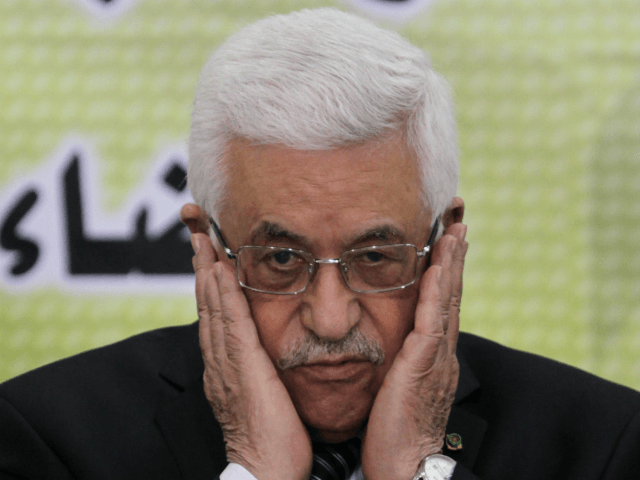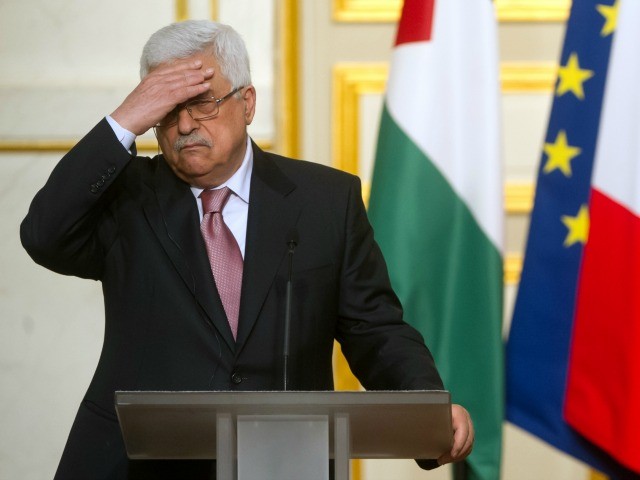Palestinian Authority President Mahmoud Abbas (left) greets Israeli Prime Minister Benjamin Netanyahu at the White House, September 1, 2010. (Jason Reed /Reuters)
The administration’s foreign policy is a welcome break from the preexisting Washington consensus.
President Donald Trump has promised that in the Middle East under his presidency, “there are many things that can happen now that would never have happened before.” Two speeches of the last ten days offer dramatic confirmation of the emerging reconfiguration of America’s relationship with Israel and the Middle East under his leadership.
In a two-hour speech before the Council of the Palestine Liberation Organization (PLO) last week, Mahmoud Abbas, president of the Palestinian Authority, denounced the British, Dutch, French, and Americans for having conspired, ever since the 1650s, to create a Jewish colonial outpost that would “erase the Palestinians from Palestine.”
As Abbas tells it, all this reached a climax on the eve of World War I, when the West realized that it was on the verge of collapse and that the Islamic world was “poised to inherit European civilization.” To put an end to this threat, the Western nations went about carving up the Muslim world so that it would be forever “divided, backward, and engulfed in infighting.”
As for the United States, it has been “playing games” of this sort ever since then, importing, for example, the disastrous Arab Spring into Middle East. Abbas summed up by demanding an apology and reparations from Britain for the Balfour Declaration and denying that the United States can serve as a mediator in the Mideast.
Finally, he went to the trouble of cursing both President Trump and the U.S. Congress: Yehrab beitak (“May your house be razed”), he said.
I have been following the speeches of the PLO and its supporters in the Arab world for 30 years. Nothing here is new. These are the same things that Yasser Arafat, Abbas, and the mainline PLO leadership have always believed. It is a worldview that reflects an abiding hatred for the West, blaming Christians and Jews not only for the founding of Israel but for every calamity that has befallen the Muslim and Arab world for centuries.
What should be one’s policy toward an organization committed to such an ideology? One option is to sympathize with the shame and outrage to which the PLO gives voice, and to try to mitigate it with grants of territory, authority, prestige, and large-scale ongoing funding. American administrations have pursued this option, seeking to make a peace partner out of the PLO, since President Ronald Reagan announced a dialogue with it in December 1988.
Israel, too, has pursued this option, since 1993. President Trump's 8 Biggest Accomplishments But in the ensuing 30 years of talk, the only major agreements signed have been those the PLO leadership could find a way to fit into its narrative: Agreements such as the 1993 Oslo Accords, which could be portrayed as inflicting a bitter defeat on Israel and the West — and as a step on the road to ultimate triumph.
President Trump, Vice President Pence, and United Nations Ambassador Nikki Haley are pioneering an alternative policy, which can be summed up in Haley’s words: “We’re not going to pay to be abused.” If players like the PLO, North Korea, Pakistan, and Iran (hopefully, Turkey gets added to this list soon) want to cultivate a civilizational hatred of America, double-talking while they give aid to global terrorism and conjure diplomatic scandals at the U.N. — well, then they don’t get to be allies. They don’t get funded. They don’t get grants of land, authority, and prestige. Those things will be reserved for actual allies.
In a speech before the PLO last week, Mahmoud Abbas expressed the familiar worldview marked by hatred for the West, blaming Christians and Jews for every calamity that has befallen the Muslim and Arab world for centuries. What this looks like was already on display when Trump became the first serving U.S. president to visit the kotel (the Western Wall) in Jerusalem in May, shredding the longstanding diplomatic taboo against making it look as though the holiest site in Judaism is in fact part of the State of Israel.
Since then, Trump and Haley have taken on UNESCO (United Nations Educational, Scientific and Cultural Organization) and the U.N. Commission on Human Rights, which regularly disseminate the PLO’s view of history and current affairs. The Trump administration has cut in half America’s massive financial support of UNRWA (the United Nations Relief and Works Agency for Palestine Refugees in the Near East), an organization whose purpose is to maintain generations of unabsorbed descendants of Palestinian Arab refugees, inculcating them in Abbas-style grievances against Israel and the West.
Mike Pence’s address on Monday to Israel’s parliament, the Knesset, continued this trajectory. But he also responded to Abbas’s history lesson with some tasteful but potent narrative-weaving of his own. In addition to the traditional script pointing to the shared interests of the United States and Israel as democracies, Pence emphasized that it was significant to him as an American that “our founders turned to the Hebrew Bible for direction” in establishing their country and that Israel’s story “inspired my forebears to create . . . a new birth of freedom.”
He returned repeatedly to the way in which the story of the Jewish people holding fast to God’s promise to return them to their land “shows the power of faith.” Pence even said the traditional Jewish shehehianu blessing (in Hebrew!), thanking God for bringing us to see this day in which the Jewish people have been restored to their land.
On policy, Pence said that Trump “righted a 70-year wrong” in recognizing Jerusalem as Israel’s capital, and that the U.S. embassy would be in the city “by the end of next year.” He promised Israel that “the United states will never allow Iran to acquire a nuclear weapon.”
As for the PLO, Pence gave eloquent and persuasive voice to his country’s desire for peace. But his bottom line also marked a significant shift from previous American administrations: The U.S., Pence said, would support a PLO state “if both sides agree.” In other words, whether there will be such a state is Israel’s call to make. Which puts American policy light years away from the heyday of George W. Bush’s “road map,” and his breathy “vision of two democratic states, Israel and Palestine, living side by side in peace.”
For a change, there was no daylight between the views Pence outlined in the Knesset and those of his Israeli hosts. Prime Minister Benjamin Netanyahu said that President Trump’s recognition of Jerusalem would go down in Jewish history together with the Balfour Declaration in 1917 and Truman’s recognition of Israel in 1948.
Isaac Herzog (Labor), the leader of the opposition, pointed out that it is “the love of the Bible that connects us to one another.” Knesset Speaker Yuli Edelstein (Likud) spoke of the Jewish state “fulfilling the words of the prophets” and of “the United States, more than any other country in the world, as Israel’s faithful partner” in this effort.
As for the curses that Abbas called down on President Trump’s house, the Israelis responded by blessing him: Netanyahu told Pence it is “our deepest hope that President Trump and you will succeed in strengthening the United States, . . . so that America will continue to be the greatest power in the world for generations to come.” And Edelstein said that from Israel he would only hear the blessing Bneh Beitcha (“May your house be built up”).
There is no shortage of commentators saying that this embrace of Israel is only going to harm the prospects for peace in the Middle East. That view reflects the consensus in Washington before President Trump got there.
For long decades, Washington has crafted policies based on the tacit assumption that America needs the PLO if it is to bring peace to the Middle East. In its effort to “balance” the demands of this extremist organization against Israel’s concerns, American policy inflated the PLO’s importance, and it learned to tolerate and even embrace an organization whose views have always been profoundly anti-Western, not to mention anti-Semitic.
Meanwhile, the Biblical roots of America’s alliance with Israel have been consistently downplayed for fear that mentioning them would upset Arab sensibilities. Even so elementary a move as recognizing Jerusalem as Israel’s capital, or cutting funding to chronically anti-Western and anti-Semitic organizations, became unthinkable.
These policies did not bring peace to the Middle East. But they severed the ties between American diplomacy in the region and common sense — to the point that more than a few U.S. officials ended up believing that not only the PLO, but even Iran, whose parliament regularly curses the United States, could be made a peace partner if it were paid handsomely enough.
The Trump administration, on the other hand, appears to have good grasp of a principle that is under-rated but nonetheless quite useful in making sound policy: In the relations between nations, it matters who blesses you and who curses you.




